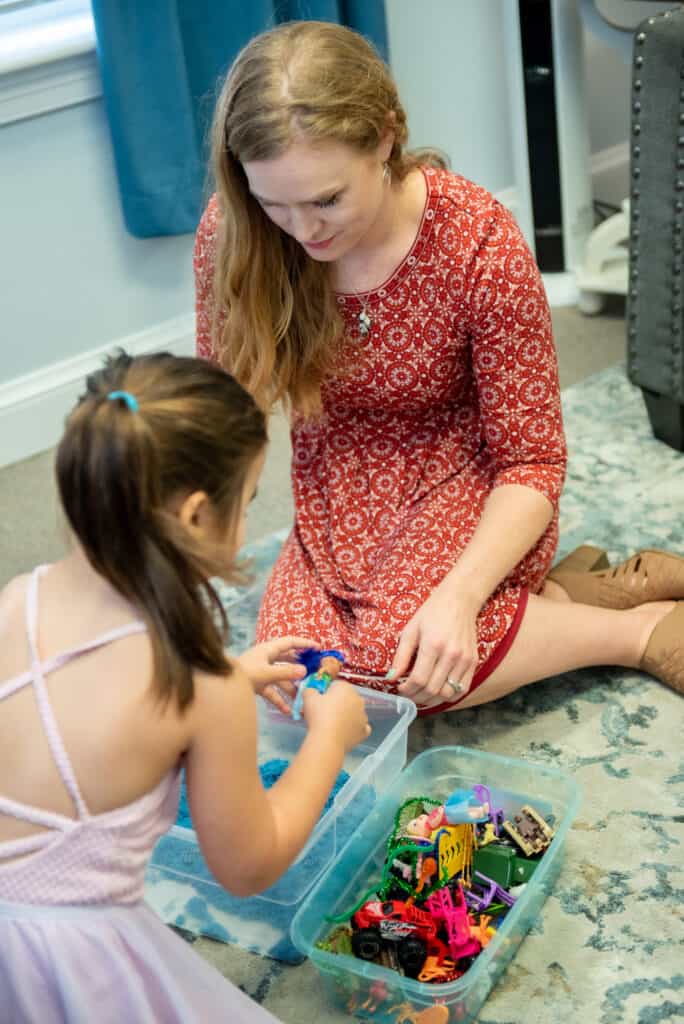“How can I help my 8 year old learn to manage his emotions? He has some really BIG emotions for such a little guys. He gets tearful and anxious around thoughts of daddy “going away” (he catastrophizes). I suffer from really bad anxiety and I want to help him early on so he doesn’t have to suffer like I did?”
Hi there! I understand this is difficult – parenting is hard, and seeing your child struggle with big emotions can be heartbreaking. The good news is that big emotions mean your son is attuned and cares deeply. However, they also come with unique challenges that need support.
A big part of managing big emotions is prevention. Keep a journal to track what, where, when, and who was in the environment before the big emotions came up. You will likely start to detect patterns which can help you prevent, or prepare, for the big emotions before they come.
Once those big emotions hit, it can be hard not to rush in and try to fix them as quickly as possible. As parents, we often attend to our kids’ needs first and seeing kids’ big emotions can trigger big emotions in us. You have to put your oxygen mask on first before assisting others! Focus on keeping yourself regulated, so that you can help him regulate himself. Children breathe in what we breathe out. Our job as parents is to share our calm, not join in their chaos. If you can remain steady in the midst of his dysregulation, it will help bring down the intensity more quickly.
Your next step is to HALT and ask yourself, is my child:
-Hungry?
-Angry?
-Lonely?
-Tired?
Focus on meeting these basic needs and soothing your child before trying to talk things through with them. Validate and connect, before you correct. Name the emotion and describe what you see: “Wow, you are feeling pretty upset right now. You really don’t want to leave the park”. Validating helps comfort your child’s limbic system, so the prefrontal cortex (the part of the brain that helps us think rationally and control our behavior) can go to work. You can learn more about this by clicking here. As long as your child isn’t damaging property or hurting themselves or others, let them express what they are feeling.
Of course, big emotions can turn into big behaviors that need correction, and consequences are necessary to help our kids learn. Once your child is regulated, you can then go in and use positive discipline strategies to address the behavior. Remember, the goal of discipline is “to teach” rather than “to punish”. Use the 5 R’s of Consequences from Positive Parenting Solutions as a guide:
–Respectful: Don’t convey blame, shame or pain.
–Related: The consequence needs to be related to the behavior (i.e. lose a toy if it’s thrown). If you cannot think of a related consequence, try to tie one back in to the behavior (i.e. you are losing your iPad to help you focus on improving your grades).
–Reasonable: The consequence must be reasonable in duration. This is based on the child’s age and developmental stage.
–Revealed: The consequence should be made known in advance whenever possible in order to establish expectations (i.e. If you choose to throw the toy, the toy will be taken away).
–Repeated back: Your child should always repeat back the rule or consequence to ensure understanding.
For consequences to be effective, you must stay consistent and follow through on them.
Lastly, instill hope in your child by letting them know they are capable of making a good choice and learning from their mistakes. Mistakes help us grow!
If the situation is not getting better or feels too much for you to handle on your own, enlist the help of a child therapist. Sometimes you and your child need a partner to help navigate the situation and take a closer look at what might be driving the big emotions.
Stay hopeful – this sensitivity shows great empathy and emotional intelligence underneath those big feelings. With consistency and empathy, you can teach him how to develop healthy emotional regulation.
Check out these helpful resources if you’d like to learn more:
-The Whole-Brain Child: 12 Revolutionary Strategies to Nurture Your Child’s Developing Mind by Dan Siegel and Tina Bryson
-No-Drama Discipline: The Whole-Brain Way to Calm the Chaos and Nurture Your Child’s Developing Mind by Dan Siegel and Tina Bryson
-Positive Discipline: The Classic Guide to Helping Children Develop Self-Discipline, Responsibility, Cooperation, and Problem-Solving Skills by Jane Nelson
–Positive Parenting Solutions 7-Step Parenting Success System
With love and support,
Kathryn Brown
LCMHC, NCC, EMDR Therapist
Click here to book a session with one of our Licensed Therapists!

